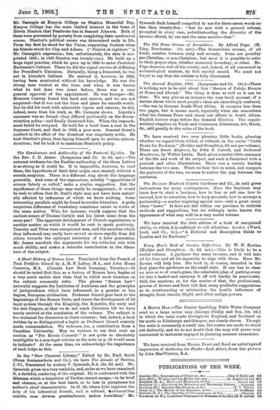The Genuineness and Authorship of the Pastoral Epistles. By the
Rev. J. D. James. (Longmans and Co. 3s. 6d. net.)—The external evidence for the Pauline authorship of the three Letters lass strong as it could be. It is impossible, however, to read them, the hypothesis of their later origin once started, without a certain suspicion. There is a different ring about the language generally. And some of the expressions, notably "oppositions of science falsely so called," make a similar suggestion. But the significance of these things may easily be exaggerated; it would be rash to affirm that St. Paul's style may not have been materi- ally affected by influences of which we know nothing. Some interesting parallels might be found in secular literature. A quite suspicious difference of vocabulary sometimes exists in works of the same author. Who, for instance, woul4 suppose that the earliest essays of Thomas Carlyle and his latest came from the same pen? The apparent development of Church organisation is another matter on which it would be rash to speak positively. Timothy and Titus were exceptional men, and the societies which they influenced may easily have moved on more rapidly than did others towards the episcopal autocracy of a later generation. Mr. James marshals the arguments for the orthodox side with much ability, and makes a valuable contribution to the litera- ture of the subject.






































 Previous page
Previous page